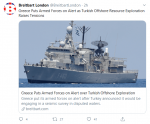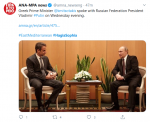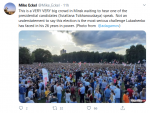You are using an out of date browser. It may not display this or other websites correctly.
You should upgrade or use an alternative browser.
You should upgrade or use an alternative browser.
INTL Europe: Politics, Economics, and Military- July 2020
- Thread starter Plain Jane
- Start date
Plain Jane
Just Plain Jane
A thread reporting on hostage situation in Ukraine.
 www.timebomb2000.com
www.timebomb2000.com
TERRORISM - . Shots fired as gunman seizes bus and takes hostages in Ukraine .
. Shots fired as gunman seizes bus and takes hostages in Ukraine . https://www.google.com/url?sa=t&source=web&rct=j&url=https://www.nbcnews.com/news/amp/ncna1234438&ved=2ahUKEwjZrN62yd7qAhWQVN8KHaObANEQr_oDegQIBBAP&usg=AOvVaw0FKllkHT8DZId5XRS_I2rR&cf=1
Plain Jane
Just Plain Jane

Exclusive: Germany wants to introduce car toll across EU - document
German Transport Minister Andreas Scheuer aims to clear the way for an almost blanket motorway toll for cars across Germany and Europe during the country's presidency of the European Union, a draft document seen by Reuters on Wednesday showed.
NEWS
JULY 22, 2020 / 4:37 AM / UPDATED 2 HOURS AGO
Exclusive: Germany wants to introduce car toll across EU - document
Markus Wacket
2 MIN READ
BERLIN (Reuters) - German Transport Minister Andreas Scheuer aims to clear the way for an almost blanket motorway toll for cars across Germany and Europe during the country’s presidency of the European Union, a draft document seen by Reuters on Wednesday showed.
Within eight years, almost all vehicles on motorways, including lorries, vans and cars, would have to pay tolls, according to the draft for the EU toll directive.
“As regards member states that have already established a charging system, tolls or user charges shall be levied upon all vehicles except coaches and buses,” stated the document which Scheuer wants German ministries to approve on Wednesday.
That would make it Germany’s official proposal for its presidency of the bloc which started on July 1 and runs until the end of the year.
However, some government officials told Reuters that some German ministries wanted to put the project on ice even though a distance-based toll is widely seen as a measure to help protect the climate.
It is particularly sensitive for ministries headed by the Social Democrats (SPD), who share power with Chancellor Angela Merkel’s conservatives and have long been critical of car tolls.
Reporting by Markus Wacket; Writing by Madeline Chambers; Editing by Michelle Martin
Our Standards:The Thomson Reuters Trust Principles.
Plain Jane
Just Plain Jane

Germany cracks down on slaughterhouse sub-contracting to fight coronavirus
Germany is introducing a new law compelling meatpackers to employ staff directly in industrial abattoirs rather than sub-contracting to avert further coronavirus outbreaks exacerbated by poor working conditions, a draft law showed on Wednesday.
NEWS
JULY 22, 2020 / 6:21 AM / UPDATED 2 HOURS AGO
Germany cracks down on slaughterhouse sub-contracting to fight coronavirus
2 MIN READ
BERLIN (Reuters) - Germany is introducing a new law compelling meatpackers to employ staff directly in industrial abattoirs rather than sub-contracting to avert further coronavirus outbreaks exacerbated by poor working conditions, a draft law showed on Wednesday.
German slaughterhouses have faced criticism for the widespread use of sub-contracted migrant workers from eastern Europe, with cramped accommodation and poor oversight suspected of accelerating local coronavirus outbreaks in abattoirs.
Labour Minister Hubertus Heil has condemned the system of “sub-sub-sub-contracting” in abattoirs, where subcontractors rely on other subcontractors to get staff.
The draft law, introduced by Heil and seen by Reuters, bans sub-contracting in the industry’s core business areas of animal slaughtering and meat processing. Firms are only allowed to outsource work in non-core business areas such as cleaning.
It also provides stricter regulation of shared accommodation for employees and a minimum quota of annual on-the-spot inspections in companies.
Small, family-run butchers with fewer than 30 employees are exempt from the new rules, which will apply from January 2021.
Chancellor Angela Merkel’s cabinet is expected to pass the draft law next week after further input from other ministries.
Toennies, a large abattoir and meatpacking group at the centre of a massive coronavirus outbreak in western Germany, has said it would hire 1,000 workers directly by Sept. 1 and stop using sub-contractors.
The Toennies plant in Rheda-Wiedenbrueck reopened its slaughterhouse and meatpacking operations last week after it bolstered health and safety procedures.
The site, particularly important for the German pig farming sector, closed in mid-June after about 1,500 workers tested positive for COVID-19. The outbreak led to about 600,000 people in the surrounding region being put back into lockdown, which has since been lifted.
Reporting by Holger Hansen; Writing by Michael Nienaber; Editing by Maria Sheahan and Madeline Chambers
Our Standards:The Thomson Reuters Trust Principles.
northern watch
TB Fanatic
northern watch
TB Fanatic
Plain Jane
Just Plain Jane

Germany and France: Youth riot and attack police – DW – 07/22/2020
First it was Stuttgart, then Frankfurt that saw groups of young men attacking the police. What is behind the violence? And are commentators right to draw comparisons with scenes in French cities?
Germany and France: Cities shocked as youths riot and attack police
First it was Stuttgart, then Frankfurt that saw groups of young men attacking the police. What is behind the violence? And are commentators right to draw comparisons with scenes in French cities?

Germany's cities have seen outbursts of pent-up rage and violence in recent weeks. First Stuttgart, then Frankfurt. On both occasions, police were targeted by an outpouring of aggression from hundreds of mainly young men. Shopfronts were destroyed, stores were plundered. Dumpsters were hurled across the streets. Video recordings from Frankfurt show bystanders cheering on as men make a sport of throwing bottles at police officers.
Read more: Stuttgart recons with youth rage after riots rock the city
The violence has sparked fierce debate in Germany. Many are asking to what extent restrictive measures to combat the COVID-19 pandemic might have stoked the aggression.
And another question; Why are a majority of the rioters apparently members of immigrant communities? Could Germany face the kind of violence and unrest that has for so long torn through France's notorious banlieues?
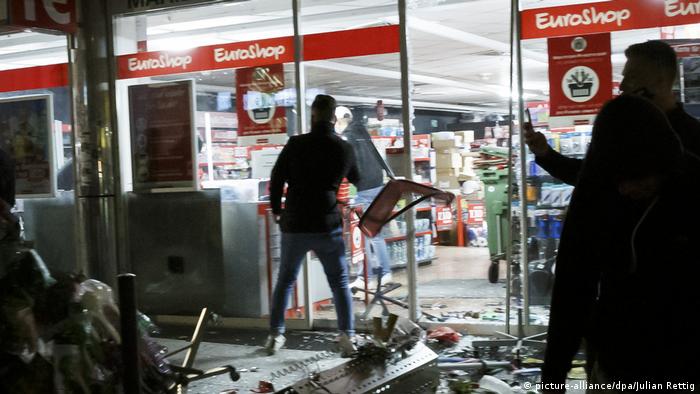
In Stuttgart windows were smashed, shops were looted
How incendiary is corona?
Coronavirus is like a fire accelerant, political scientist Stefan Luft told DW. But he rejects the notion that the pandemic is the main cause of the violence.
Read more: Coronavirus anger foments violence against journalists
Criminologist Dirk Baier agrees. He is head of the Institute of Delinquency and Crime Prevention at the Zurich-based University of Applied Sciences. "COVID-19 has led to a high level of frustration. But there's more to it than that," Baier told DW.
It is the same 'ingredients' each weekend. Alcohol flows and the later it gets, the greater the tension. Conflicts break out. The police intervene. The situation escalates and begins to get out of hand.
"All you need is for sufficient young men to have crossed the threshold, to have overcome their inhibitions — people who probably already have a history of violence." And if you have enough people with that kind of background coming together, according to Baier's analysis: "Things explode."
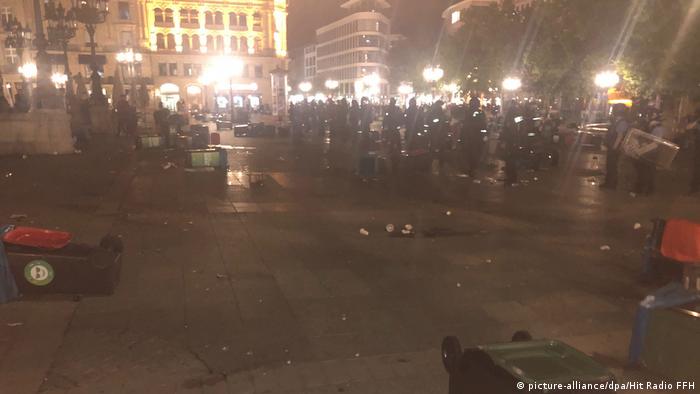
On the main square in Frankfurt young men were hurling bottles at police
This seems to be precisely what happened in Frankfurt. The police say that the vast majority of the 39 arrested were already known to the police in connection with offenses like theft or drug trafficking.
Read more: Teens in Germany sharing more brutal content online
The issue of identity
Both in Stuttgart and in Frankfurt a large number of the rioters were members of immigrant communities.
Germans call this having a 'Migrationshintergrund' — a 'migration background.' And this term, too, is incendiary, with angry disputes over who can use it and why. Are we, for instance, talking about first, second or third-generation Germans? Migrant workers? Illegal migrants? Refugees or asylum-seekers? Or what?
Read more: German police defend immigrant background probe into riot suspects
What, if any, is the direct link between migration and violence? It is a question that is asked often and loudly by the populist far-right Alternative for Germany (AfD) party. Its leaders were quick to share videos of the rioting on twitter, implying that such scenes may soon be seen across the entire country.
Both the AfD and Angela Merkel's conservative CDU party draw a direct line between what they see as a breakdown in law and order and what they deem to be failed integration strategies.
Political scientist Stefan Luft also believes that problems with integration are one explanation for the outburst of violence among young men in Stuttgart and Frankfurt: "They have a divided identity. On the one hand, they distance themselves from what might be their country of origin and their parents' culture. But the problem is that at the same time they haven't properly arrived in their new surroundings, their new culture." As a result, they tend to move in a sub-culture where violence might escalate."
Read more: Racial profiling debate in Germany
"It is not the 'migration background' that triggers the violence," Dirk Beier argues. He says it is rather the biographical context that he sees as a burden. "Migrant communities are confronted with higher levels of unemployment and a sense that they have no future," he observes.
The criminologist points out that men with a 'migration background' do tend to share 'violence-oriented male norms.' Baier goes on to describe them as "young men who don't have much that they can rely upon beyond their physicality. They're probably not very well integrated as far schooling, training, getting a profession are concerned. And they are very likely to have a track record of violence, which is something that they probably experienced growing up in their own families."
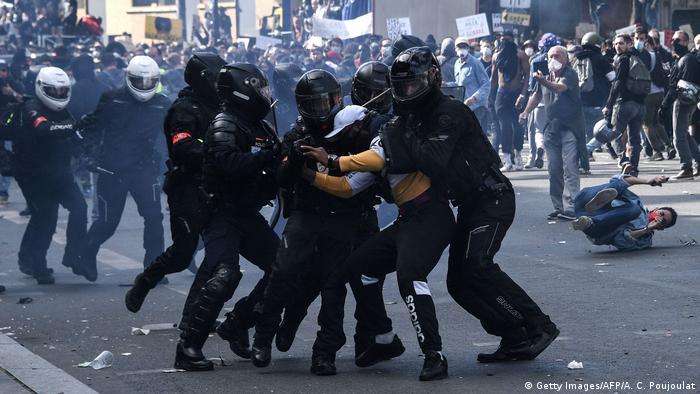
The killing of George Floyd by police resonated with people in France and led to violent protests
Just like France?
The scenes in Stuttgart and Frankfurt have led to talk of parallels with rioting in the suburbs of some of France's larger cities, the banlieues, where migrants make up a large proportion of the community. Social conditions are, to put it mildly, harsh. Every couple of years tensions erupt into violence that all too often leaves a trail of devastation through the banlieues. The images that are then transported are similar to those in Frankfurt. And there is another parallel: hatred of the police.
Read more: French police officers charged with manslaughter
One of the biggest outpourings of violence in France in recent times came in 2005 and followed the deaths of two teenagers in a car chase with the police. In the same way, eruptions in Stuttgart and Frankfurt also came after police operations.
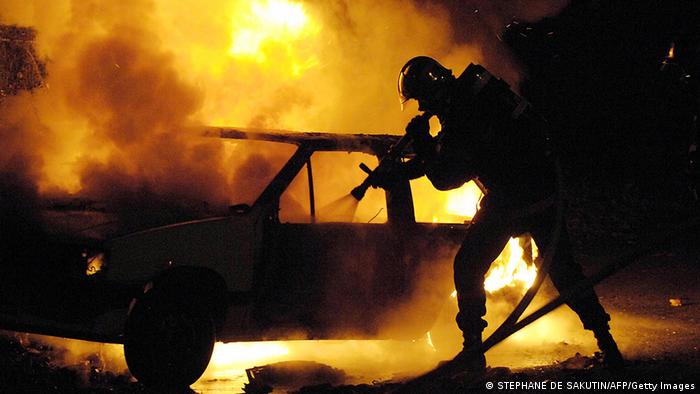
In 2005 young migrants in Paris' banlieues went on a rampage torching cars several nights in a row
"It's also got something to do with the language that people have in recent weeks been using to talk about the police," says Baier. The German police, he goes on, have been accused again and again of racism, without it really being clear that the charge is justified: "What is clear is that for people from the migrant community, it's a persuasive narrative for encounters with the police: Here we go again, it's me they're after because I'm a migrant. It's the same thing all over the world and I'm not going to bow to it."
And the situation in Stuttgart did indeed escalate after a drug control. "It's always said that the police have a racist approach to drug controls. And that's precisely what happened: first drug control, then escalation," Baier points out.
Read more: Macron leaves France's suburbs in the lurch
But although there might be some similarities: how convincing are parallels with France really? After all: "We don't have the same degree of social polarization in our cities," says social scientist Luft. There is little indication, he adds, of an explosion of violence in one district of a city that has been left far behind. But, we must be vigilant and make sure that social housing is divided fairly across our cities in order to avoid whole areas being blighted.
Dirk Baier also says he does not expect social conflagrations to be making regular headlines in the foreseeable future. "Germany is a stable society. The police will respond."
Stefan Luft is no doubt that the police must do what it takes to protect the public space. But, he insists: they must get full political backing to do so.
Plain Jane
Just Plain Jane

New wave of boat migrants overwhelms southern Italian island
About 100 migrants who crossed the Mediterranean in small boats landed on the southern island of Lampedusa during the night, the latest in a wave of arrivals straining an already overcrowded holding centre.
NEWS
JULY 24, 2020 / 6:29 AM / UPDATED 25 MINUTES AGO
New wave of boat migrants overwhelms southern Italian island
Mauro Buccarello
2 MIN READ
LAMPEDUSA, Italy (Reuters) - About 100 migrants who crossed the Mediterranean in small boats landed on the southern island of Lampedusa during the night, the latest in a wave of arrivals straining an already overcrowded holding centre.
Officials said the migrants, arriving from Libya, were either rescued at sea or managed to avoid detection and reach the island.
The arrivals of small boats, some carrying as few as eight people, brought to nearly 1,000 the number of migrants who have reached the island from Libya in the last three days.
About 15 boats carrying some 300 migrants arrived during the night between Wednesday and Thursday.
They were put in a holding centre called the “hotspot”. Designed to hold about 100 people, in recent days it has been home to nearly 10 times as many.
Provincial officials this week ordered the emergency transfer of about 300 migrants to another centre in Sicily.
The recent overcrowding in Lampedusa has also led to immigration resurfacing as a political issue.
Former interior minister Matteo Salvini, leader of the anti-immigrant League party, visited Lampedusa and the “hotspot” on Wednesday and accused the government of Prime Minister Giuseppe Conte of being soft on illegal migration.
"I can’t wait to return to a government with serious people so I can close the ports again to block delinquents and reopen them to law-abiding citizens,” he told supporters on the island.
When he was interior minister in the previous government, which collapsed about a year ago, Salvini closed Italian ports to rescue ships run by charities.
In response, Enrico Borghi, of the governing Democratic Party, accused Salvini of being a “demagogue” and said the current government was not going to “watch men and women drown”.
Writing by Philip Pullella; Editing by Giles Elgood
Our Standards:The Thomson Reuters Trust Principles.
Plain Jane
Just Plain Jane

Istanbul's Hagia Sophia opens as a mosque for Muslim prayers
Turkish President Recep Tayyip Erdogan has fulfilled a dream of his Islamic-oriented youth and joined hundreds of worshipers for the first Muslim prayers in 86 years inside Istanbul’s landmark Hagia Sophia.
Click to copy
Istanbul’s Hagia Sophia opens as a mosque for Muslim prayers
By MEHMET GUZEL and SUZAN FRASERan hour ago

1 of 9
Faithful wait at the historic Sultanahmet district of Istanbul, outside the Byzantine-era Hagia Sophia, Friday, July 24, 2020. Hundreds of Muslim faithful were making their way to Istanbul's landmark monument Friday to take part in the first prayers in 86 years at the structure that was once Christendom's most significant cathedral and the "jewel" of the Byzantine Empire then a mosque and museum before its re-conversion into a Muslim place of worship. The conversion of the edifice, has led to an international outcry. (AP Photo/Yasin Akgul)
ISTANBUL (AP) — Thousands of Muslim faithful made their way to Istanbul’s landmark Hagia Sophia on Friday to take part in the first prayers in 86 years at the structure that once was one of Christendom’s most significant cathedrals, then a mosque and museum before its reconversion into a Muslim place of worship.
Turkish President Recep Tayyip Erdogan is scheduled to attend the inaugural prayers inside the sixth-century monument along with around 500 dignitaries, as he fulfills what he has described as the “dream of our youth” anchored in Turkey’s Islamic movement.
Thousands of men and women, including many who traveled from across Turkey, quickly filled specially-designated, segregated areas outside of Hagia Sophia, to be part of the first prayers. Several camped near the structure overnight. Dozens of worshipers broke through one police checkpoint to rush toward Hagia Sophia and social distancing practices, in place due to the coronavirus outbreak, were being ignored, Turkish media reported.
Orthodox church leaders in Greece and the United States, meanwhile, were scheduled to observe “a day of mourning” over the inaugural prayers.
Brushing aside international criticism, Erdogan issued a decree restoring the iconic building as a mosque earlier this month, shortly after a Turkish high court ruled that the Hagia Sophia had been illegally made into a museum more than eight decades ago. The structure, listed as UNESCO World Heritage site, has since been renamed “The Grand Hagia Sophia Mosque.”
The move sparked dismay in Greece, the United States and among Christian churches who had called on Erdogan to maintain it as a museum as a nod to Istanbul’s multi-religious heritage and the structure’s status as a symbol of Christian and Muslim unity. Pope Francis expressed his sadness.
Built by the Byzantine Emperor Justinian in 537, Hagia Sophia was turned into a mosque with the 1453 Ottoman conquest of Istanbul. Mustafa Kemal Ataturk, the founding leader of the secular Turkish republic converted the structure into a museum in 1934.
Although an annex to the Hagia Sophia, the Sultan’s pavilion, has been open to prayers since the 1990s, religious and nationalists group in Turkey have long yearned for the nearly 1,500-year-old edifice, which they regard as the legacy of Ottoman Sultan Mehmet the Conquerer, to be reverted into a mosque.
“This is Hagia Sophia breaking away from its captivity chains. It was the greatest dream of our youth,” Erdogan said last week. “It was the yearning of our people and it has been accomplished.” Erdogan also described its conversion into a museum by the republic’s founding leaders as a mistake that is being rectified.
In neighboring Greece, bells tolled and flags flew at half-staff at hundreds of churches across the country in protest at the decision to convert Hagia Sophia into a mosque. The Greek Orthodox Church leader, Archbishiop Ieronymos, will hold a special service at Athens Cathedral later Friday. Churches in Athens, Greece’s second-largest city, Thessaloniki, are also organizing vigils.
“Today is a difficult day .. a shadow hangs over us with the transformation of Hagia Sophia into a mosque — something that genuinely shocks Christians all over the world and not only Greeks,” Greek government spokesman Stelios Petsas said in an interview with private channel Open TV. “We have warned for some time that this will create an unbridgeable gap between Turkey and the Christian world.”
The history and religious traditions of the predominantly Greek-speaking and Orthodox Christian Byzantine Empire remain influential in Greece. The church protests also occurred amid a volatile dispute between Greece and Turkey over mineral rights in the eastern Mediterranean, with the Greek military on alert over a planned Turkish maritime survey in waters claimed by Greece.
In New York, the Greek Orthodox Archdiocese of America, called the inaugural prayers a “cultural and spiritual misappropriation and a violation of all standards of religious harmony and mutual respect.” Archbishop Elpidophoros of America held a meeting with U.S. President Donald Trump and Vice President Mike Pence in Washington on Thursday to discuss concerns over the reconversion.
Turkey has vowed to protect Hagia Sophia’s artifacts and has said it will remain open to visits by Muslims and non-Muslims outside of prayer hours. The structure’s mosaics depicting Christian figures are being covered with sail-like white drapes during the prayers.
___
Suzan Fraser reported from Ankara, Turkey. Derek Gatopoulos in Athens contributed to this report.
Plain Jane
Just Plain Jane

Europe warns Turkey over natural gas mission – DW – 07/24/2020
French President Emmanuel Macron has called for sanctions against Turkey for encroaching on EU member states' territorial waters. But Ankara has rejected such claims, saying Turkey is well within its right.
Europe warns Turkey against natural gas mission near Greece
French President Emmanuel Macron has called for sanctions against Turkey for encroaching on EU member states' territorial waters. But Ankara has rejected such claims, saying Turkey is well within its right.
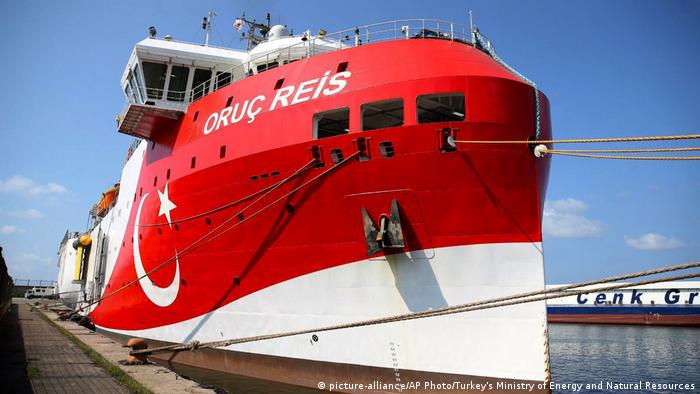
European officials on Thursday warned Turkey against pursuing a survey mission looking for gas reserves near Greek islands in the eastern Mediterranean.
Greece and Cyprus have accused Turkey of undermining their sovereignty by continuing to pursue energy resources within their territorial waters.
"The government is underlining to all parties that Greece will not accept a violation of its sovereignty and will do whatever is necessary to defend its sovereign rights," said Greek government spokesman Stelios Petsas.
French President Emmanuel Macron has called for sanctions against Turkey, saying it is "not acceptable for the maritime space of a European Union member state to be violated or threatened."
Last year, the EU adopted a sanctions regime targeting Turkey over its unauthorized gas drilling in Cypriot waters.
The instrument provides the EU with a way "to sanction individuals or entities responsible for, or involved in, unauthorized drilling activities of hydrocarbons in the eastern Mediterranean," according to a statement by EU foreign ministers in November.
Read more: Turkey's maritime claims in the Mediterranean Sea raise thorny legal questions
Turkey defiant
However, Turkey has rejected claims that its energy-related activities in the region are transgressing Greek or Cypriot sovereignty. Instead, the Turkish government has claimed that it is well within its right — or those of Turkish Cypriots — to explore areas claimed by Cyprus and Greece.
"We want all natural resources in the eastern Mediterranean to be shared fairly," said Turkish presidency spokesman Ibrahim Kalin. "We will never accept threats or sanctions. We do not accept Greece's maximalist position."
Turkish survey ship Oruc Reis's mission remains "valid and effective," according to the port in which it is currently anchored off of. Its mission is likely to run through to August 2.
US officials have chided Turkey for pursuing the mission despite several warnings.
"I want to echo the clear message from Washington and elsewhere in Europe, urging Turkish authorities to halt operations that raise tensions in the region, such as plans to survey for natural resources in areas where Greece and Cyprus assert jurisdiction in the eastern Mediterranean," said US Ambassador to Greece Geoffrey Pyatt.
lws/stb (AFP, Reuters, AP)
Plain Jane
Just Plain Jane
On going thread about Hagia Sophia:
 www.timebomb2000.com
www.timebomb2000.com
ALERT - Erdogan declares Hagia Sophia a mosque after Turkish court ruling
Erdogan declares Hagia Sophia a mosque after Turkish court ruling July 10, 2020 / 9:21 AM / Updated an hour ago Daren Butler, Ece Toksabay ISTANBUL (Reuters) - President Tayyip Erdogan declared Istanbul’s Hagia Sophia a mosque on Friday with the first Muslim prayers to begin in two weeks...
Plain Jane
Just Plain Jane
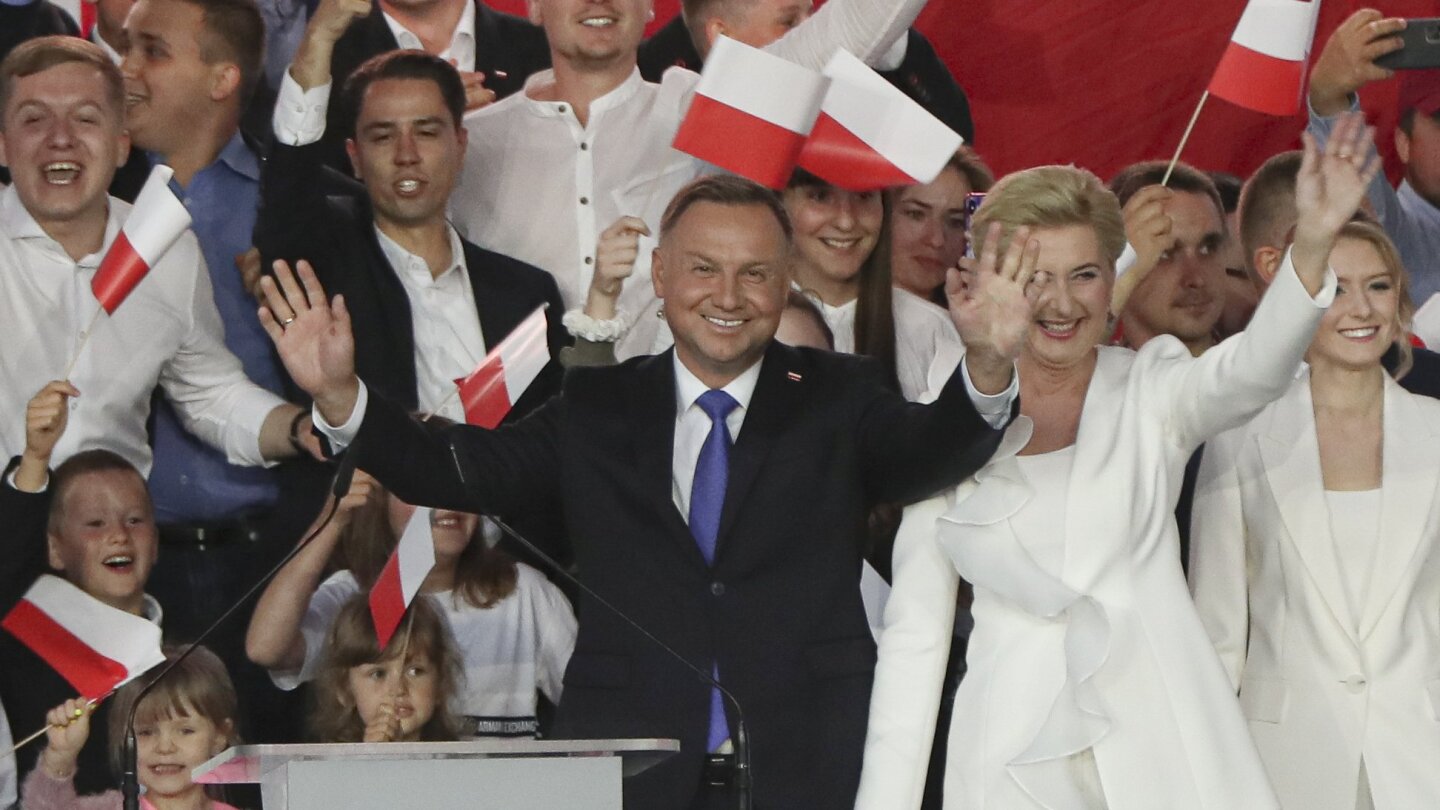
Runner-up's team wants Poland's presidential election voided
WARSAW, Poland (AP) — The campaign team for the opposition challenger in Poland's presidential election, Warsaw Mayor Rafal Trzaskowski, says it now wants the vote annulled, alleging numerous irregularities.
Runner-up’s team wants Poland’s presidential election voided
July 22, 2020

1 of 2
El presidente Andrzej Duda, acompañado por su esposa Agata Kornhauser-Duda, saluda a sus simpatizantes el domingo 12 de julio de 2020, en Pultusk, Polonia. (AP Foto/Czarek Sokolowski)
WARSAW, Poland (AP) — The campaign team for the opposition challenger in Poland’s presidential election, Warsaw Mayor Rafal Trzaskowski, says it now wants the vote annulled, alleging numerous irregularities.
The liberal Trzaskowski lost the July 12 runoff by a narrow margin to conservative incumbent President Andrzej Duda. Trzaskowski, who received 48.97% of votes, earlier conceded defeat to Duda, who received 51.03%.
Trzaskowski’s team and his Civic Platform party lodged a protest with the Supreme Court last week arguing that state-run media and the government were unfairly involved in boosting Duda’s campaign, while not all Poles abroad were able to cast ballots.
Polish media reported Wednesday that Trzaskowski’s team and his party are also urging the top court to declare the election void.
A spokesman for Trzaskowski’s team, Jan Grabiec, confirmed it to The Associated Press.
Questions also have been raised about the legality of the election, whose first round was held on June 28 but was originally scheduled for May. It was pushed back at the last moment amid political wrangling over concerns for public health during the coronavirus pandemic.
The court, whose new president was recently appointed with the government’s backing, has until Aug. 3 to rule on the protest and some 6,000 others lodged.
Additional information here:
INTL - Poland: Globalist Opposition Demands Election Re-Do After Liberals Lose
www.breitbart.com /europe/2020/07/25/poland-globalist-demands-election-re-run/ Poland: Globalist Opposition Demands Election Re-Run After Liberals Lose Virginia Hale 4-5 minutes Poland’s globalist opposition party has demanded a presidential election re-run after losing to patriotic incumbent...
Plain Jane
Just Plain Jane

Hungarian PM claims EU win but rule-of-law dispute not over
Hungary's prime minister says his country won a “very important battle” at the European Union summit this week, where the bloc's leaders decided an seven-year budget and coronavirus recovery.
Click to copy
Hungarian PM claims EU win but rule-of-law dispute not over
By PABLO GORONDIJuly 24, 2020

1 of 5
FILE- In this Friday, May 15, 2020, file photo, Hungarian Prime Minister Viktor Orban listens to a question during a press conference after a meeting with Serbian President Aleksandar Vucic in Belgrade, Serbia. Hungary's prime minister says that his country won a “very important battle” at the European Union summit this week, where national leaders of the 27-member bloc decided an seven-year budget and economic recovery package to counter the effects of the coronavirus pandemic. (AP Photo/Darko Vojinovic, File)
BUDAPEST, Hungary (AP) — Hungary’s prime minister on Friday touted what he called his victory at the European Union summit, where the bloc’s leaders decided on a massive seven-year budget and coronavirus recovery plan, but acknowledged he did not achieve his goal of de-linking EU funds from rule of law considerations.
Hungary and Poland, two nations led by right-wing populist governments, are both in the midst of EU proceedings over concerns that they are violating EU standards with laws and practices that threaten the independence of judges and press freedoms, and could face sanctions. At the marathon EU summit that ended Tuesday, leaders had debated tying receiving EU funds to demands that member nations follow EU democratic standards but did not explicitly do so.
“Polish and Hungarians ... thwarted the attempt of others deciding about the money due to us,” Prime Minister Viktor Orban said Friday on state radio about the EU deal worth just over 1.8 trillion euros ($2 trillion) in which Hungary and Poland were considered to be among the greatest beneficiaries.
At the end of the summit, Orban said “any attempt to make a connection between the rule of law and the budget was ... successfully rejected,” but on Friday he acknowledged the issue is far from settled.
“We didn’t win the war but simply only a very important battle,” Orban said.
According to news site portfolio.hu, Hungary may get as much as 52.8 billion euros ($61.3 billion) from the EU in the seven-year budget period starting in 2021, about 35% more than in the last budget.
Orban arrived at the EU summit with a resolution from the Hungarian parliament demanding, among other things, an end to an EU sanctioning process launched against Hungary in 2018 due to rule of law concerns.
But German Chancellor Angela Merkel, whose country holds the rotating EU presidency, said the initiative to close the proceeding “must come from Hungary.”
“Hungary would like — this is what Prime Minister Orban has told me — for this not to be such an impasse,” Merkel at the end of the summit. “We will support Hungary in this. But the decisive paths must, of course, be specified by Hungary.”
While Orban had mentioned even vetoing a deal at the summit if funds were tied to rule of law standards, it would have been highly risky to go directly against the wishes of Germany, which is Hungary’s largest trading partner and was strongly behind the coronavirus recovery package.
“Viktor Orban understood that he could not fundamentally oppose German aspirations and interests, which were for there to be an agreement by all means,” said Attila Tibor Nagy of the Center for Fair Political Analysis.
He said with Germany worried about a collapse of key export markets like Italy and Spain, “the Hungarian government realized that the rule of law clause was not worth vetoing over.”
After the EU summit, however, EU officials reiterated that nations still must adhere to democratic standards. There are also concerns that Hungary and Poland have refused to join the EU public prosecutor’s office, which will be investigating fraud connected to EU funds.
Hungary has built a rash of large soccer stadiums in small towns under Orban’s rule. Some officials in Hungary and other EU nations have also been accused of obtuse land deals that gave them access to EU farm subsidies while impoverishing farmers.
“Protecting our budget and the respect for the rule of law go hand in hand,” EU Commission President Ursula von der Leyen said Thursday in the EU Parliament. “We must also do everything we can to protect European money by stepping up the fight against fraud.”
“This means having the right controls in place, including a database that puts us in the position to know who the final beneficiaries of EU funding are,” she added.
Von der Leyen said the Commission would seek to again advance its proposal for funding cuts to member states that had a lack of judicial independence or other democratic failings.
And EU Parliament President David Sassoli said this week that tying rule of law demands to disbursements was “a topic the Parliament cares a lot about.”
The EU legislature on Thursday adopted a resolution by a wide majority which, while criticizing cuts to the 2021-2027 EU budget in research and health, also expressed lawmakers’ desire to make sure that governments violating the bloc’s “fundamental values” will have their access to EU funds blocked or limited.
The European Parliament has the final say in approving the budget.
Given that atmosphere, the Orban government is preparing supporters for new confrontations with the EU over its perceived democratic deficits.
Hungarian Justice Minister Judit Varga, who has faced strong criticism in the European Parliament while defending Hungarian policies, told the pro-government Magyar Nemzet newspaper that “the gist of the fight is yet to come.”
“I expect a new series of tougher, more unscrupulous attacks than ever before to begin in the fall,” Varga said.
Analysts said the trend in the EU was to reinforce rule of law principles.
“It’s evident that Viktor Orban sees, as do others, that the EU is increasingly going moving toward the implementation of these kinds of conditions and the retention of funds,” said Andrea Virag, strategic director at Republikon Institute, a Budapest-based liberal think-tank. “So while they may be talking about a victory, they are readying themselves and voters that a debate about this is still to come.”
___
Associated Press writers Samuel Petrequin in Brussels and Geir Moulson in Berlin contributed to this report.
Melodi
Disaster Cat
One note on the situation in Poland, everyone involved with this knew that this was going to happen NO MATTER WHICH SIDE was declared the winner.
This is another one of those types of elections that the "Deep State" (or whatever you want to call them loves) one so close that they are extremely easy to "rig" and even when there is little to no actual voter fraud (and they're almost always is some in any election) that the losing side can mount a challenge and keep things going in the courts for months.
If the Liberals had one, the Conservatives would be doing the same thing (it was already in the water).
Also, in the "all news is local" category, the votes are 50/50 split pretty much down the old population lines that go back to WWII (that was pointed out by a family friend from Poland) and is the sort of thing without local knowledge it would be difficult to spot.
The result in voting is the explode an existing division that already existed in the "Country" for decades between the area with a traditional German "influence" and those without.
This is another one of those types of elections that the "Deep State" (or whatever you want to call them loves) one so close that they are extremely easy to "rig" and even when there is little to no actual voter fraud (and they're almost always is some in any election) that the losing side can mount a challenge and keep things going in the courts for months.
If the Liberals had one, the Conservatives would be doing the same thing (it was already in the water).
Also, in the "all news is local" category, the votes are 50/50 split pretty much down the old population lines that go back to WWII (that was pointed out by a family friend from Poland) and is the sort of thing without local knowledge it would be difficult to spot.
The result in voting is the explode an existing division that already existed in the "Country" for decades between the area with a traditional German "influence" and those without.
Plain Jane
Just Plain Jane

Ukraine says separatists violated ceasefire within hours
A full and comprehensive ceasefire between Ukrainian government forces and pro-Russian separatists that entered into force in eastern Ukraine on Monday has already been violated by separatists, Ukrainian military said.
NEWS
JULY 27, 2020 / 5:47 AM / UPDATED AN HOUR AGO
Full ceasefire takes effect in eastern Ukraine
2 MIN READ
KYIV (Reuters) - A full and comprehensive ceasefire between Ukrainian government forces and pro-Russian separatists has entered into force in eastern Ukraine, opening the prospect of an end to military and civilian casualties, the two sides said on Monday.
Ukrainian, Russian and OSCE negotiators last week agreed on a full ceasefire in eastern Ukraine from Monday, putting on hold the military conflict that has claimed more than 13,000 lives since 2014.
The deal was backed by the presidents of Russia and Ukraine, Vladimir Putin and Volodymyr Zelenskiy, who agreed “the need for an urgent implementation of extra measures to support the ceasefire regime in Donbass”.
Zelenskiy has sought to resolve the conflict since his election last year, arranging a number of prisoner swaps.
“We are talking about the possibility of a real ceasefire on both sides,” the head of Ukraine’s joint forces operation Volodymyr Kravchenko told a televised briefing.
“The situation is stable and controlled,” he added.
On Sunday, Ukraine’s defence ministry said in a statement that its forces “stand ready to give a proper rebuff to the enemy in case of violation of the agreements”.
The separatists’ DNA news agency said on Monday observers “did not record any violations of the ceasefire by the security forces of Kiev, starting from 00:01 on July 27 this year.”
Ukraine and Russia have been foes since 2014, when Moscow seized Ukraine’s Crimea peninsula and backed the rebellion in the east.
Major combat ended with a ceasefire agreed in the Belarus capital Minsk in 2015, but sporadic clashes still regularly kill civilians, Ukrainian soldiers and separatists.
Reporting by Pavel Polityuk and Natalia Zinets, Editing by William Maclean
Our Standards:The Thomson Reuters Trust Principles.
Plain Jane
Just Plain Jane
Zerohedge
ZeroHedge - On a long enough timeline, the survival rate for everyone drops to zero
Germany Rejects Trump Bid To Let Russia Back Into G7: 'No Chance Due To Ukraine'

by Tyler Durden
Mon, 07/27/2020 - 13:30
TwitterFacebookRedditEmailPrint
For much of the past year Trump has caused angst among allies by maintaining a consistent position that Russia should be invited back into the Group of Seven (G7), making it as it was prior to 2014, the G-8.
Russia had been essentially booted from the summit as relations with the Obama White House broke down over the Ukraine crisis and the Crimea issue. Trump said in August 2019 that Obama had been "outsmarted" by Putin.
But as recently as May when Germany followed by other countries rebuffed Trump's plans to host the G7 at Camp David, Trump blasted the “very outdated group of countries” and expressed that he planned to invite four additional non-member nations, mostly notably Russia.
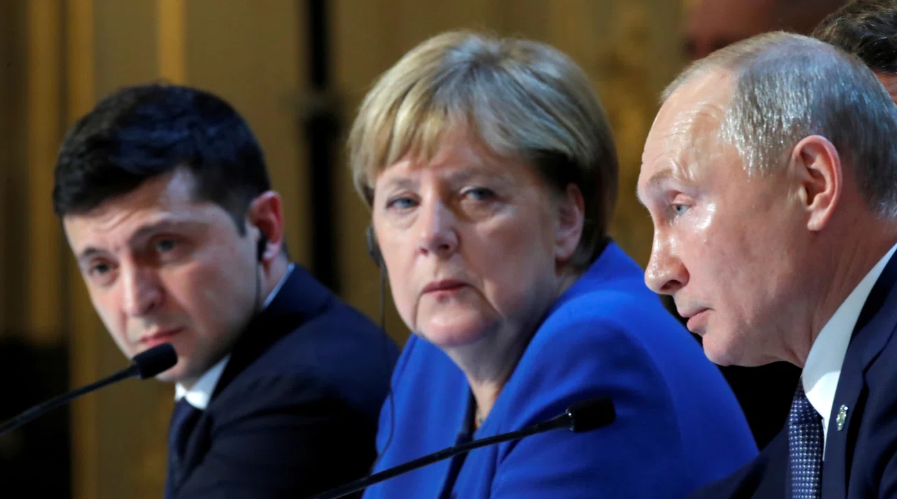 File image via TellerReport
File image via TellerReportCiting coronavirus fears, Merkel bowed out, followed by others. But the Russia issue has remained on the table, with Trump refusing to back down.
Germany, however, has also refused to budge, per Reuters:
Interestingly enough the Ukraine and Crimea issues were raised in the interview: "But Maas told Rheinische Post that he did not see any chance for allowing Russia back into the G7 as long as there was no meaningful progress in solving the conflict in Crimea as well as in eastern Ukraine," according to the report.Germany has rejected a proposal by U.S. President Donald Trump to invite Russian President Vladimir Putin back into the Group of Seven (G7) most advanced economies, German Foreign Minister Heiko Maas said in a newspaper interview published on Monday.
Maas to some degree left a door open, suggesting that Russia's biggest contribution to the G7 might be to facilitate a "peaceful solution" to the Ukraine crisis. "Russia also has to make its contribution, which is very slow in Ukraine," Maas said.
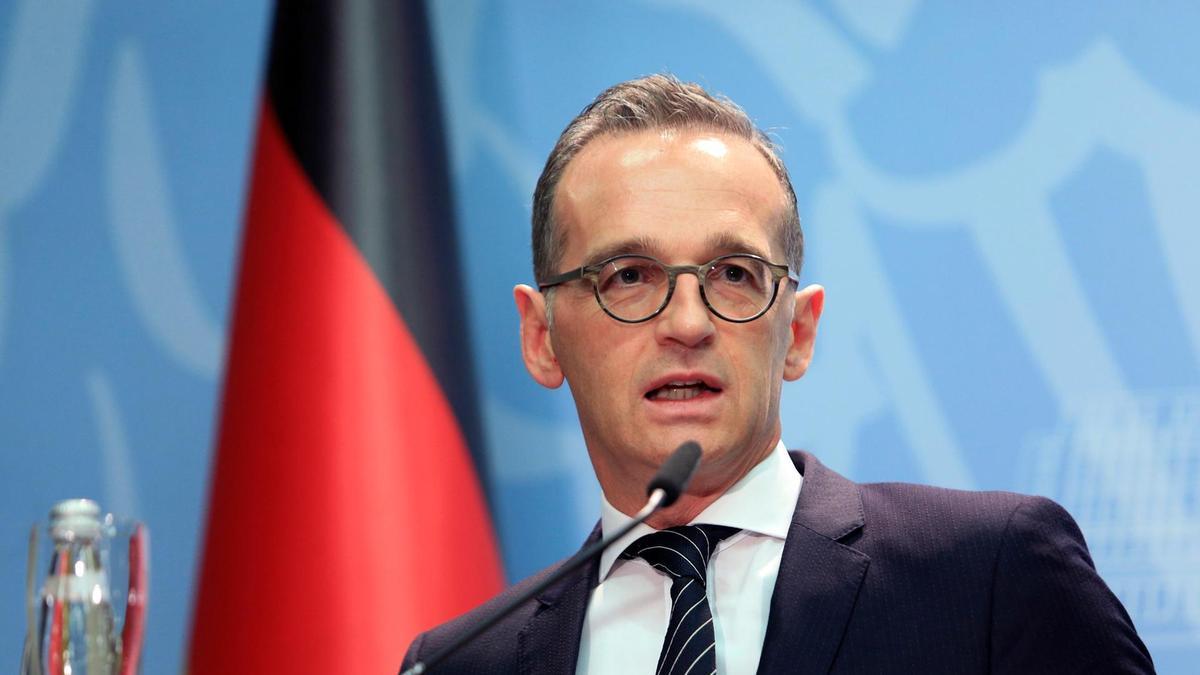 German Foreign Minister Heiko Maas, via AP.
German Foreign Minister Heiko Maas, via AP.Recall Trump's previously unpopular comments on the issue blaming the past administration. "President Obama was helping Ukraine. Crimea was annexed during his term... President Obama was pure and simply outsmarted... it could have been stopped," Trump said during the 45th G7 summit at the end of last summer held in Biarritz, France.
European officials have claimed Trump's insistence on letting Russia back in has "ruined" past meetings among the lead economic powers.
Plain Jane
Just Plain Jane
Zerohedge
ZeroHedge - On a long enough timeline, the survival rate for everyone drops to zero
World Bank/IMF Exposed: COVID Aid Conditional On Imposing Extreme Lockdowns, Curfews

by Tyler Durden
Tue, 07/28/2020 - 03:30
TwitterFacebookRedditEmailPrint
Via GreatGameIndia.com,
Huge foreign loans are given to sovereign nations by the World Bank, IMF and the likes. But the conditions that come attached to these loans are seldom told by governments to their citizens.
A recent case in Belarus has exposed the conditions laid by these agencies for loans being provided for COVID-19. The President of Belarus has exposed that the World Bank coronavirus aid comes with conditions for imposing extreme lockdown measures, to model their coronavirus response on that of Italy and even changes in the economic policies which he refused as being “unacceptable”.
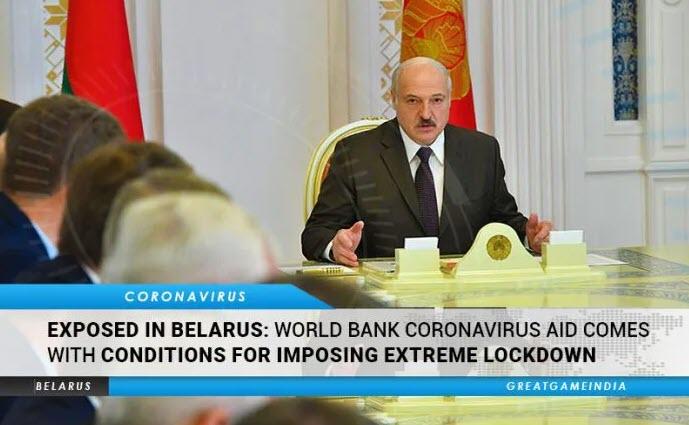
Additional conditions which do not apply to the financial part are unacceptable for Belarus, Belarus President Aleksandr Lukashenko said when speaking about external lending during a meeting to discuss support measures for the real economic sector on the part of the banking system, reported Belarusian Telegraph Agency, BelTA.
Aleksandr Lukashenko asked the participants of the meeting how things were with the provision of foreign credit assistance to Belarus.
At the same time, he stressed that additional conditions which do not apply to the financial part are unacceptable for the country.“What are our partners’ requirements? It was announced that they can provide Belarus with $940 million in so-called rapid financing. How are things here?” the head of state inquired.
According to the president, the World Bank has showed interest in Belarus’ coronavirus response practices.“We hear the demands, for example, to model our coronavirus response on that of Italy. I do not want to see the Italian situation to repeat in Belarus. We have our own country and our own situation,” the president said.
Belarus is one of the only European countries that has not implemented strict coronavirus containment measures. The no-restriction situation is such that even the non-essential services remain open. The football league of Belarus is still being played. The only restriction kind-of step that Belarus took till now is that the school holidays have been extended.“It is ready to fund us ten times more than it offered initially as a token of commendation for our efficient fight against this virus. The World Bank has even asked the Healthcare Ministry to share the experience. Meanwhile, the IMF continues to demand from us quarantine measures, isolation, a curfew. This is nonsense. We will not dance to anyone’s tune,” said the president.
Lukashenko is of the opinion that a complete lockdown was completely unnecessary. Similar, views have been expressed by many renowned scientists as well. Recently, an Indian doctor has debunked the official narrative on Coronavirus. He emphasizes that ‘stress affects health’ and said that fear isn’t necessary because eventually people will develop natural immunity to this virus. He is one of the few people to advocate the opinion that life must continue uninterrupted.
The President of Belarus is not the first one to have exposed the pressure exerted by global agencies amidst the coronavirus crisis to further their agenda.
Earlier, in a shocking development the President of Madagascar made a sensational claim that the WHO offered him $20m bribe to poison COVID-19 cure called COVID-19 Organics made from Artemisia.
The Tanzanian President kicked out WHO from the country after Goat and Papaya samples came COVID-19 positive. Days after the Tanzanian move, Burundi also kicked out WHO Coronavirus Team from the country for interference in internal matters.
It was also revealed in an intercepted human intelligence report that Bill Gates offered $10 million bribe for a forced Coronavirus vaccination program in Nigeria. After which, an Italian politician demanded the arrest of Bill Gates in the Italian parliament. She also exposed Bill Gates’ agenda in India and Africa, along with the plans to chip the human race through the digital identification program ID2020.
Plain Jane
Just Plain Jane

Belarus seeks Russian explanation after detaining suspected mercenaries before election
Belarus leader Alexander Lukashenko said he would demand an explanation from Russia after Belarusian security forces detained more than 30 suspected Russian mercenaries near Minsk, Belarusian state media reported on Wednesday.
NEWS
JULY 29, 2020 / 6:00 AM / UPDATED AN HOUR AGO
Belarus detains 32 mercenaries near Minsk, reports Belta news agency
1 MIN READ
MINSK (Reuters) - Belarusian law enforcement detained 32 people working for a foreign private military group near Minsk overnight, the Belta news agency reported on Wednesday.
The agency gave no more details.
Private military companies are illegal in Belarus, which is holding a presidential election on Aug. 9.
President Alexander Lukashenko, a 65-year-old former Soviet collective farm boss, faces the biggest challenge in years to his iron-fisted rule of the eastern European country, as anger swells over his handling of the coronavirus pandemic, the economy and human rights.
Lukashenko has accused opposition protesters of trying to overthrow him in the same way as the Russian-backed President of Ukraine Viktor Yanukovich was toppled by the Maidan street protests in 2014.
Reporting by Andrei Makhovsky; writing by Tom Balmforth and Pavel Polityuk; Editing by Alex Richardson
Our Standards:The Thomson Reuters Trust Principles.
MORE FROM REUTERS
northern watch
TB Fanatic
Plain Jane
Just Plain Jane

Belarus says Russians plotted attacks; Kremlin rolls eyes
MINSK, Belarus (AP) — Belarusian authorities on Thursday accused more than 30 detained Russians of plotting terror attacks amid a presidential election campaign, allegations that Russian officials angrily rejected.
Click to copy
Belarus says Russians plotted attacks; Kremlin rolls eyes
By YURAS KARMANAUyesterday

1 of 10
FILE - In this file photo taken on Tuesday, June 30, 2020, Russian President Vladimir Putin, left, and Belarusian President Alexander Lukashenko greet WWII veterans during an opening ceremony of the monument in honour of the World War II Red Army, in the village of Khoroshevo, just outside Rzhev, about 200 kilometers (about 125 miles) northwest of Moscow, Russia. President Alexander Lukashenko is seeking a sixth term in the Aug. 9 election but he has accused Russian forces of interfering with the upcoming vote, although Moscow has denied any involvement. (Mikhail Klimentyev, Sputnik, Kremlin Pool Photo via AP, File)
MINSK, Belarus (AP) — Belarusian authorities on Thursday accused more than 30 detained Russians of plotting terror attacks amid a presidential election campaign, allegations that Russian officials angrily rejected.
The grave accusations mark an unprecedented spike in tensions between Russia and Belarus, which are neighbors and traditionally allies. Independent observers and opposition supporters in Belarus have dismissed the alleged terror plot as a campaign stunt by President Alexander Lukashenko, the authoritarian leader who is seeking a sixth term in next month’s election.
The Belarusian State Security Committee, still known by its Soviet-era name KGB, said it detained 32 people from private Russian military firm Wagner early Wednesday at a sanitarium outside the capital of Minsk. Another person was detained in the country’s south.
Security Council Secretary Andrei Ravkov said Thursday that the Russians are facing a criminal probe on charges of plotting terror attacks in Belarus. He claimed that Belarusian authorities were searching for another 200 Russian “militants” believed to be in the ex-Soviet nation.
The Kremlin responded by urging Belarus to explain its action and to fully respect the detainees’ rights.
“There is no information about any wrongdoing of the Russians that may have caused the detention.,” Kremlin spokesman Dmitry Peskov said. He shrugged off the allegations of the Russians’ involvement in efforts to destabilize Belarus as “nothing but innuendo.”
After being summoned by the Belarusian Foreign Ministry, Russian Ambassador Dmitry Mezentsev also dismissed the accusations as unfounded. He said the Russians were en route to an unspecified country and checked into the sanitarium near Minsk after they missed a connecting flight at the capital’s airport.
Mezentsev demanded immediate consular access to the detainees and urged Belarusian authorities to show their evidence against the Russians.
The Wagner company is linked to Yevgeny Prigozhin, a Russian businessman who was indicted in the United States for meddling in the 2016 U.S. presidential election. The firm has allegedly deployed hundreds of military contractors to eastern Ukraine, Syria and Libya.
Many observers have pointed out that Belarus long has provided a transit corridor for sensitive Russian operations abroad.
Lukashenko is campaigning to remain in office amid an upsurge in opposition protests fueled by public fatigue with his iron-fisted rule and a painful economic fallout from the coronavirus pandemic. Some observers see the detention of the Russians as an attempt by the president to mobilize public support in the Aug. 9 election.
“Amid a sharp drop in his popularity, Lukashenko has to turn to theatrical gestures to scare everyone and to try to stem the wave of protests,” Alexander Klaskovsky, an independent political analyst based in Minsk, said.
Throughout his 26-year rule, Lukashenko has relied on cheap Russian energy and loans to keep his nation’s Soviet-style economy afloat. Belarus and Russia have a union deal envisaging close political, economic and military ties, but Moscow has recently cut some of the subsidies, arguing that Belarus must accept closer integration to receive energy resources at a discount.
The Belarusian leader has bristled at Russian demands and accused the Kremlin of harboring plans to deprive Belarus of its post-Soviet independence.
“The new scandals help remind the Kremlin that it needs to pay for loyalty,” Klaskovsky said.
Belarus’ Investigative Committee said Thursday it was also investigating whether the detained Russians could have been involved in preparations for staging “mass riots” as part of a criminal probe against a jailed opposition blogger, Sergei Tikhanovsky. He has been in custody since May on charges of attacking a police officer, which he rejected as a provocation
Tikhanovsky’s wife, Svetlana, who is challenging Lukashenko in the election, dismissed the new accusations against her husband as “absolutely unlawful.” Election officials rejected attempts by two other potential presidential challengers to register for the race.
Over 20,000 Tikhanovskaya’s supporters gathered Thursday at her rally in Minsk, the biggest since the start of the campaign. Many participants dismissed the official claims of a Russian subversion plot as a sham.
“We are worried about the lack of money to buy food and medicines, not some mythical enemies and plots,” retiree Nikolai Ostapchuk, 72, said.
“No one believes in these thriller stories about Russian militants, which are intended to switch our attention, scare us and keep us at home,” said 43-year-old driver Dmitry Furkovsky.
—-
Daria Litvinova and Vladimir Isachenkov in Moscow contributed to this report.

